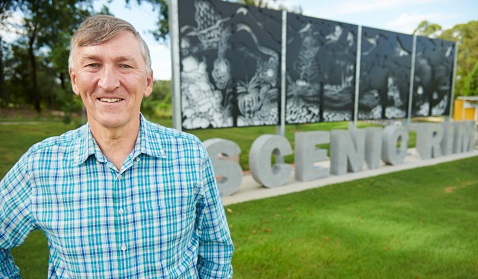Greg Christensen was elected to the Scenic Rim Regional Council as Mayor in 2016 and successfully re-contested the 2020 election for a second term.
With a professional background in human resources and business improvement, along with a varied career with companies like CSR, Holden, and OneSteel, Cr Christensen is presently the executive officer of Step Up (Qld).
What does your typical mayoral working day look like?
Hmm, what is typical?
On non-Ordinary Meeting days it might be: 7.30 coffee with CEO to discuss general progress and gain awareness of any “hot button issues”; meet/Skype/Teams/Zoom with relevant parties on issues of the day, eg, bushfire recovery/economic development/progress of strategic issues with other levels of government and peer councils; planning scheduling with my assistant for forward week/quarter and preparing responses to correspondence; internal updates on specific matters (eg, updates of progress with specific issues or community inquiries); reading/research on critical topics.
As Covid-19 passes, fingers crossed, I am now heading back into evening events/AGMs/chambers of commerce meetings/community club presentations.
Q: What is the best aspect of your job?
Hard to choose – getting out and about to talk across communities about what is possible and being able to lay an exciting foundation for a strong future for our region through both infrastructure and building belief.
Q: What is the worst aspect of your job?
Dealing with myopic mindsets and the constant loud resistance of small minorities – as I see it, a waste of energy.
Q: What is the most rewarding project you have worked on during your time in local government?
Again, hard to choose – Commencing the program to transform our town and village centres to be modern, vibrant hearts for our communities; and championing a regional prosperity focus on diversification of industries and high value job creation.
Q: Your council is among the many that bore the brunt of the Black Summer bushfires. What are the lessons, looking ahead, for disaster preparedness and mitigation at the local level?
Resilience is both an individual and integrated community life skill to be nurtured.
Local government leaders need to be at the forefront of managing the disaster preparedness/acute stage response and recovery; timely relevant delivery of information and communication connected to the language and actual circumstance of specific communities is critical, and local leaders partnering with the emergency agencies have a strong role to play.
How these messages are delivered is critical to the value they create; the first role of a leader is to bring hope and confidence in disaster.
If things go a little wrong – praise in public and critique in private. There is usually enough emotion and uncertainty around, and a civic leader should not add to it or make cheap points.
Q: The coronavirus pandemic has created serious financial headaches for councils. What can be done longer-term to ensure local government funding is adequate to provide the services residents, businesses and communities expect.
The current funding tends to be mostly tied to specific grants and this is not always flexible enough to match the specific local needs and is also often targeted to the capital side of the ledger.
Generally, the only flow to the operating expense side is the FAGs and this has not kept pace with the demands and pressures on councils.
Operating service delivery has been the area under constant pressure from increasing resident and visitor expectation, with increasing movement of responsibility from other levels of government for delivery and increasing regulatory standards to meet.
We all know it, but it bears repeating: Local Government, with 3 percent of tax revenue, runs 33 percent of community infrastructure.
Q: What is the best piece of advice you have received regarding local community service as an elected official?
Use the same triage skills you would in an emergency – those making the loudest noise are not necessarily the ones most at risk or that need most focus.
Q: If someone standing for council were to ask you for advice, how would you respond?
Be sure you are prepared to have no expectation of privacy, no right of reply, and to be the target of tabloid campaigns if you want to create change.
But the rewards of delivering better futures for your community is the greatest joy you will ever experience.
Q: What is your favourite place, and why?
My front verandah – I look across a section of wonderful horticultural land, into the majesty of the border ranges and Cunninghams Gap and the Main Range National Park.
Living in “the richest place on earth – in Australia” inspires me every day.
Q: How would you reflect on the difference that you’ve made in your community and local government in general?
I committed to bring integrity, honesty, and vision as I entered local government, and to do what was right, not necessarily popular. I strive for every member of our community to know they are important, even if we do not agree.
Despite a series of disaster challenges, our economy has continued to grow and build jobs and I am sure will continue to build that trajectory as we come out of Covid-19.
I have also passionately and proudly promoted the merits of our amazing region far and wide.



